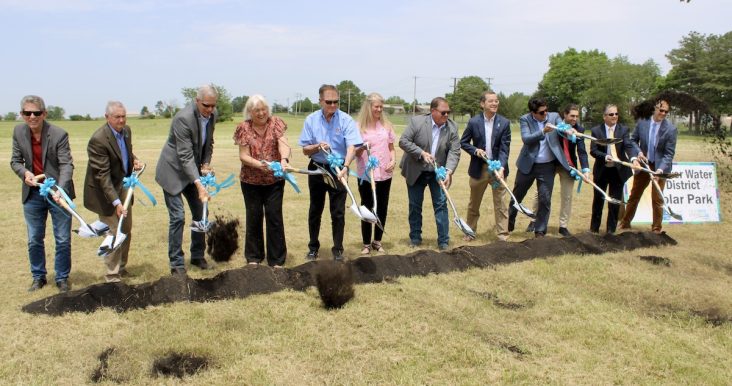Beaver Water District breaks ground on nearly 5-megawatt solar array
by May 15, 2025 5:38 pm 982 views

Area leaders gathered Thursday (May 15) in Lowell for a groundbreaking ceremony on a $10 million solar array for Beaver Water District.
Lowell-based utility Beaver Water District will invest about $10 million into a 4.99-megawatt solar array adjacent to the district’s administrative center.
Area officials gathered Thursday (May 15) for a ceremony to kick off construction of the Beaver Water District Solar Park. The more than 10,000-panel array will be built on about 32 acres at 301 N. Primrose Road in Lowell.
It will use single-axis tracker technology for each unit and feature bifacial panels that collect light on both the front and back of the modules. This is expected to increase the array’s output and lower the energy cost. The project is expected to be completed in late 2025.
“It will benefit not only the district, our customer cities, but all of the residents here in Northwest Arkansas,” said Lane Crider, CEO of Beaver Water District. “From a natural resource perspective, this project is going to provide between 15% and 20% of our electrical needs. That’s huge in a current…market environment where…costs are rising. Price volatility is an issue to a large degree, that’s out of control, certainly from us, but even from our electric provider, Carroll Electric, who has been a fantastic partner in this process.”
NextEra Energy Resources is the developer of the array, which Verogy will build. The district will own the array after it’s built. Earlier this year, NextEra Energy managed and Verogy completed a 4.99-megawatt array in Gentry for Lowell-based J.B. Hunt Transport Services Inc.
Crider said the array will provide “continuity and…assurance of what our future energy costs will be. When you’re paying $400,000 a month in energy bills, you want to be able to somehow nail down those numbers.” He said the district is expanding to meet the increasing demand for drinking water in Northwest Arkansas and plans to add a new water treatment plant.
“That new 80 MGD treatment plant is going to require a lot of energy,” Crider said. “This is just one portion of how we fit this puzzle together to meet the needs of our residents here in Northwest Arkansas.”
Kevan Inboden, chief operations officer at Beaver Water District, said the district is at the start of a “major expansion program” that will cost more than $700 million and run through 2035 or 2036.
Across the street from the array site, the district is building a 16-million-gallon clear well for treated water storage. The $40 million project started earlier this year and is expected to be completed in spring 2027.
Inboden said the array project has been in development for more than two years and will receive a 1-to-1 retail rate offset for the electricity generated by the array. It will offset the retail rate that the district purchases from its electricity provider.
Inboden said the wholesale electricity market has experienced significant price increases over the past several years, which is outside the control of its electricity provider, Carroll Electric. He expects wholesale prices to continue rising. He said price volatility has been another significant challenge, and the array will provide certainty for 15% to 20% of the district’s electricity needs. Over the life of the project, it’s expected to save the district between $7 million and $11 million. The lifetime of the solar panels is projected to be at least 30 years.
“For our analysis, we use 25 years just to be a little more conservative on the economic analysis that we did,” he said. “So we feel like the numbers we came up with in terms of costs and net present savings are accurate, probably even on the conservative side.”
Inboden said the project is not expected to have a direct impact on rates but will put “downward pressure on our operating costs just by reducing our electricity needs from the utility.”
Beaver Water District provides drinking water to about 400,000 residents and businesses in Northwest Arkansas. The district sources the water from Beaver Lake through contracts with the U.S. Army Corps of Engineers. The district sells the drinking water to Fayetteville, Springdale, Rogers and Bentonville. The cities store and resell the water to their customers.
